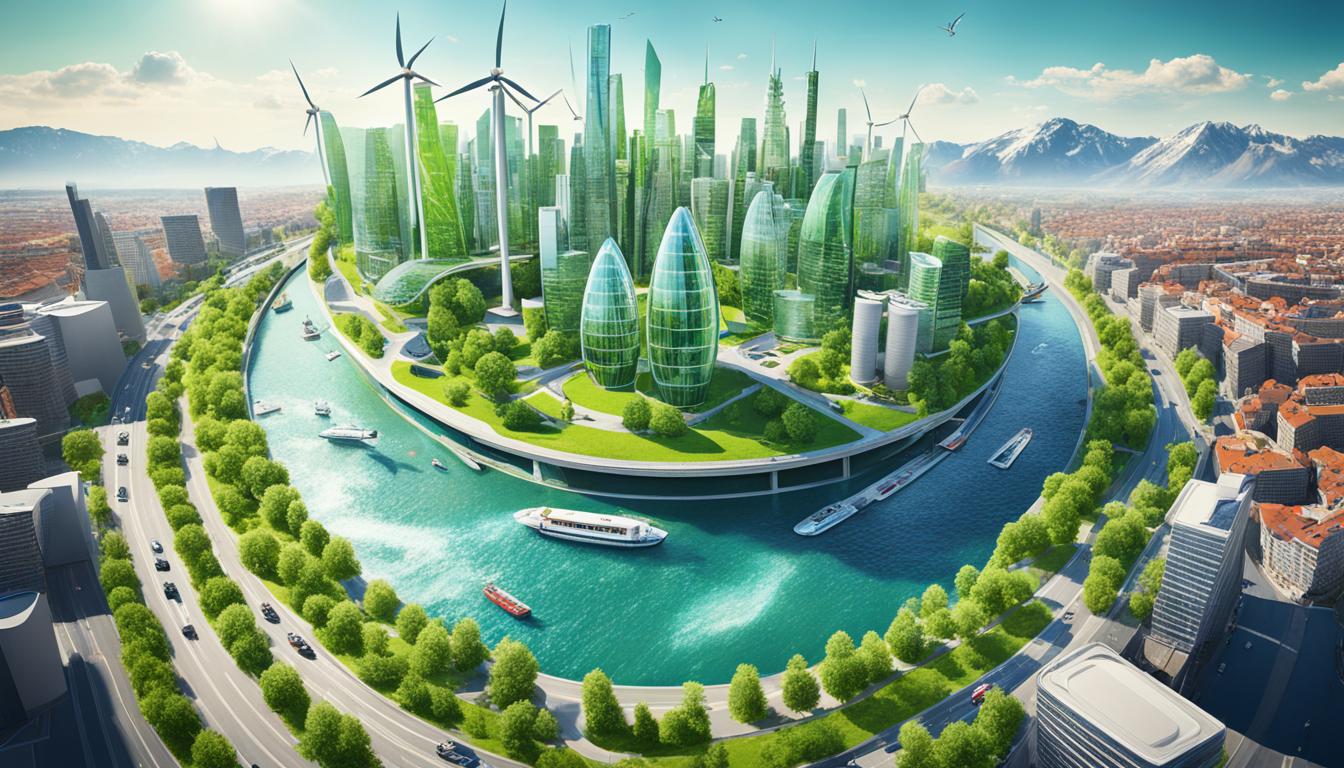
The Importance of Civil Engineering in Energy Transition
Did you know that renewable energy accounted for nearly 28% of global electricity generation in 2020? With the urgent need to combat climate change and transition to a sustainable energy system, the role of civil engineering has become more crucial than ever.
Civil engineers are at the forefront of designing and constructing efficient power plants, building resilient renewable energy infrastructure, and enhancing energy efficiency through innovative infrastructure design. Their expertise and contributions are key in propelling the global energy transition towards a greener future.
Key Takeaways:
- Civil engineering plays a crucial role in shaping and maintaining energy infrastructure during the energy transition.
- Civil engineers design and construct efficient power plants, considering factors such as site considerations, structural integrity, and energy transmission.
- They contribute to building resilient renewable energy infrastructure by ensuring stable foundations, grid integration, and assessing environmental impact.
- Civil engineers enhance energy efficiency through infrastructure design, focusing on smart grid development, energy storage solutions, and transportation infrastructure.
- Their contributions to sustainable energy infrastructure development support the goals of reducing carbon emissions, preserving natural resources, and managing water resources responsibly.
Designing and Constructing Efficient Power Plants
Civil engineers specializing in energy infrastructure play a critical role in designing and constructing power plants that prioritize efficiency and performance. They carefully analyze various factors to ensure optimal operation and maximize energy output. Here’s how civil engineers contribute to the efficient design and construction of power plants:
Evaluating Site Considerations
Before commencing the construction of a power plant, civil engineers thoroughly assess site considerations such as topography, geology, and climate. By carefully examining these factors, they can select the most suitable location for the power plant, optimizing its performance and minimizing environmental impact.
Ensuring Structural Integrity
Civil engineers prioritize the structural integrity of power plant buildings to withstand extreme conditions and operational stresses. They conduct rigorous structural analyses and consider potential natural disasters to ensure the facility’s stability and longevity. By incorporating innovative materials and designs, they enhance safety and mitigate the risk of disruptions, safeguarding both the plant and surrounding communities.
Minimizing Energy Loss during Transmission
In addition to the power plant structure itself, civil engineers also focus on designing supporting structures and electrical grids to minimize energy loss during transmission. By optimizing the layout and configuration of power lines, transformers, and substations, civil engineers ensure efficient energy flow, reducing wastage and enhancing overall energy efficiency.
With their expertise in power plant design, civil engineers contribute to the development of energy infrastructure that achieves optimal performance, maximizes energy efficiency, and supports the transition towards cleaner and more sustainable energy sources.
Building Resilient Renewable Energy Infrastructure
Civil engineers play a significant role in the development and implementation of renewable energy infrastructure. They are responsible for ensuring the stability and sustainability of foundations for solar farms and wind turbines, contributing to the long-term success of these projects.
Civil engineers carefully consider factors such as soil conditions and wind patterns when designing foundations for renewable energy structures. By conducting comprehensive geotechnical assessments, they determine the optimal design and construction methods that can withstand the environmental forces unique to each site.
In addition to foundation design, civil engineers also contribute to the integration of renewable energy sources into existing power grids. Through effective planning and coordination, they optimize connections and manage energy flow, enabling smooth grid integration and maximizing the benefits of renewable energy generation.
Furthermore, civil engineers conduct thorough environmental impact assessments to identify and mitigate any potential negative effects of renewable energy projects on local ecosystems. By assessing the environmental aspects, they ensure that renewable energy infrastructure is developed in a responsible and sustainable manner.
Overall, civil engineers’ expertise in foundation design, grid integration, and environmental impact assessments is essential for building resilient and successful renewable energy infrastructure.
The Role of Civil Engineers in Building Resilient Renewable Energy Infrastructure:
- Designing stable foundations for solar farms and wind turbines
- Integrating renewable energy sources into existing power grids
- Managing energy flow and optimizing connections
- Conducting environmental impact assessments
- Mitigating negative effects on local ecosystems
Enhancing Energy Efficiency Through Infrastructure Design
Civil engineering plays a crucial role in not only shaping individual power plants but also the surrounding infrastructure to enhance energy efficiency on a broader scale. Through their expertise and innovation, civil engineers contribute to various aspects of infrastructure design that optimize energy consumption and reduce wastage.
Smart Grid Development
Civil engineers are at the forefront of smart grid development, which integrates advanced technologies to improve energy efficiency. By implementing real-time energy monitoring, load management, and demand response systems, smart grids optimize energy consumption and reduce unnecessary energy usage. This proactive approach allows for better energy management and lays the foundation for a sustainable and resilient energy system.
Energy Storage Solutions
Efficient energy storage is vital for reducing energy waste and ensuring grid stability. Civil engineers contribute to the design and construction of energy storage facilities such as pumped hydro storage or battery farms. These solutions facilitate the efficient utilization of excess energy during off-peak periods and make it available during high-demand periods, thereby enhancing overall energy efficiency.
Transportation Infrastructure
Civil engineers recognize the impact of transportation infrastructure on energy consumption and actively work towards designing energy-efficient systems. They develop electric vehicle charging stations, implement intelligent transportation systems, and optimize traffic flow to minimize energy usage. By promoting sustainable transportation solutions, civil engineers contribute to the reduction of carbon emissions and the overall energy efficiency of transportation networks.
“Civil engineers play a vital role in enhancing energy efficiency through infrastructure design. Their expertise in smart grid development, energy storage solutions, and transportation infrastructure helps optimize energy consumption and reduce waste.”

By focusing on these areas, civil engineers drive the transition towards a greener and more sustainable energy future. Their contributions in infrastructure design pave the way for energy-efficient systems that minimize waste, promote renewable energy integration, and support a sustainable energy ecosystem.
Sustainable Solutions: How Civil Engineering Supports Energy Infrastructure Development
Did you know that civil engineering plays a vital role in shaping and maintaining sustainable energy infrastructure, supporting the global energy transition? As the world strives towards a greener future, civil engineers are at the forefront of developing and constructing renewable energy facilities, optimizing energy efficiency, and integrating renewable energy sources into the grid.
In this article, we will explore the significance of civil engineering in supporting energy infrastructure development and the transition to sustainable energy systems. We will delve into how civil engineers design and construct efficient power plants, build resilient renewable energy infrastructure, and enhance energy efficiency through infrastructure design. Additionally, we will discuss the vital role civil engineering plays in the development of energy storage solutions and the integration of renewable energy into existing transmission and distribution systems.
Key Takeaways:
- Civil engineering is crucial in shaping and maintaining sustainable energy infrastructure.
- Civil engineers design and construct efficient power plants to maximize energy performance.
- They build resilient renewable energy infrastructure, considering factors such as foundation design and grid integration.
- Civil engineers enhance energy efficiency through infrastructure design, focusing on smart grid development and energy storage solutions.
- Civil engineering supports the energy transition by developing sustainable energy systems and minimizing environmental impacts.
The Role of Energy Engineering in Sustainable Development
Energy engineering plays a pivotal role in sustainable development by designing and implementing technologies that reduce environmental impact, improve social wellbeing, and enhance governance practices. Through their expertise and innovative solutions, energy engineers contribute to the achievement of net-zero emissions, preservation of natural resources, and support for social and economic development.
Sustainable Energy Systems: Energy engineers work on developing and integrating renewable energy sources to replace fossil fuels and reduce greenhouse gas emissions. By harnessing the power of solar, wind, hydro, and other renewable resources, they contribute to the transition towards clean and sustainable energy systems.
Improving Energy Efficiency: Energy engineers play a crucial role in improving energy efficiency in infrastructure projects. They design and optimize energy systems, incorporate energy-saving technologies, and enhance building insulation and lighting to minimize energy consumption and greenhouse gas emissions.
Responsible Water Resource Management: Energy engineering also encompasses responsible water resource management. Energy engineers assess water usage in energy production, implement sustainable water treatment and cooling systems, and promote water conservation practices to minimize the environmental impact of energy generation processes.
By combining technical expertise with environmental consciousness, energy engineering contributes to a sustainable future. Energy engineers prioritize the development of net-zero emissions solutions, evaluate and mitigate the environmental and social impacts of energy projects, and promote good governance practices in the energy sector.
Example Table: Environmental Impact Comparison of Energy Sources
| Energy Source | Carbon Emissions | Water Usage | Land Requirement |
|---|---|---|---|
| Coal | High | High | Extensive |
| Natural Gas | Moderate | Moderate | Moderate |
| Solar | Low | Low | Minimal |
| Wind | Low | Low | Minimal |
As the table above demonstrates, renewable energy sources such as solar and wind have significantly lower environmental impacts compared to conventional sources like coal and natural gas. This emphasizes the importance of energy engineering in promoting sustainable energy systems that mitigate climate change, reduce pollution, and preserve our natural resources.
Innovating for the Future: Civil Engineering Contributions to Energy Infrastructure
Civil engineering professionals play a pivotal role in driving innovation within the energy sector. With their expertise in designing and constructing energy infrastructure, optimizing energy efficiency, and developing groundbreaking technologies, they contribute significantly to shaping the future of the industry.
Integration of Renewable Energy Sources
Civil engineers are at the forefront of integrating renewable energy sources into the existing energy infrastructure. They utilize their knowledge to design and develop efficient systems that harness the power of renewable resources, such as solar and wind energy. By seamlessly integrating these sources into the grid, civil engineers are helping to reduce reliance on fossil fuels and promote a sustainable energy future.
Advancement of Energy Storage Solutions
Efficient energy storage is crucial for the transition to a renewable energy-based system. Civil engineers play a vital role in advancing energy storage solutions, such as battery farms and pumped hydro storage. These technologies allow for the efficient capture and release of energy, ensuring a smooth and reliable power supply even during periods of low renewable energy generation.
Development of the Carbon Capture Industry
As the world strives to reduce carbon emissions, civil engineers are actively involved in the development of the carbon capture industry. They contribute their expertise in designing and constructing carbon capture and storage facilities that capture and store CO2 emissions from power plants and industrial processes. By driving innovation in this field, civil engineers are playing a crucial role in combating climate change.
Through collaboration with other engineering disciplines, such as structural, manufacturing, and process engineering, civil engineers address complex challenges and drive the development of cutting-edge solutions. Their contributions are essential for creating a sustainable and efficient energy sector that meets the demands of the present while safeguarding the future.
Conclusion
The role of civil engineering in the energy transition is of paramount importance in creating a sustainable future. By leveraging their expertise and collaborating with other disciplines, civil engineers play a crucial role in shaping energy infrastructure and driving the global transition to cleaner and more efficient energy sources.
Through their work, civil engineers act as catalysts for change, ensuring the efficient utilization of resources and paving the way for a greener tomorrow. Their contributions encompass designing and constructing efficient power plants, building resilient renewable energy infrastructure, and enhancing energy efficiency through infrastructure design. These efforts are essential in propelling the energy transition and creating a more sustainable future.
As we strive for a greener tomorrow, the expertise and dedication of civil engineers will continue to play a vital role in the development of sustainable and environmentally friendly energy systems. Their contributions support the global energy transition, leading us towards a more sustainable future with a reduced carbon footprint and a greater focus on renewable energy sources.
FAQ
What role does civil engineering play in the energy transition?
What factors do civil engineers consider when designing power plants?
How do civil engineers contribute to renewable energy infrastructure?
In what ways does civil engineering enhance energy efficiency?
What is the role of civil engineering in sustainable energy infrastructure development?
How does energy engineering contribute to sustainable development?
What are some of the contributions of civil engineering to the energy sector?
How does civil engineering support the transition towards a sustainable future?
Source Links
- https://utilitiesone.com/the-role-of-civil-engineering-in-energy-infrastructure-development
- https://info.stonewallco.com/blog/energy-engineering-powering-the-future
- https://www.mckinsey.com/~/media/mckinsey/business functions/operations/our insights/preparing for energy transition in infrastructure/voices-july-2021.pdf







